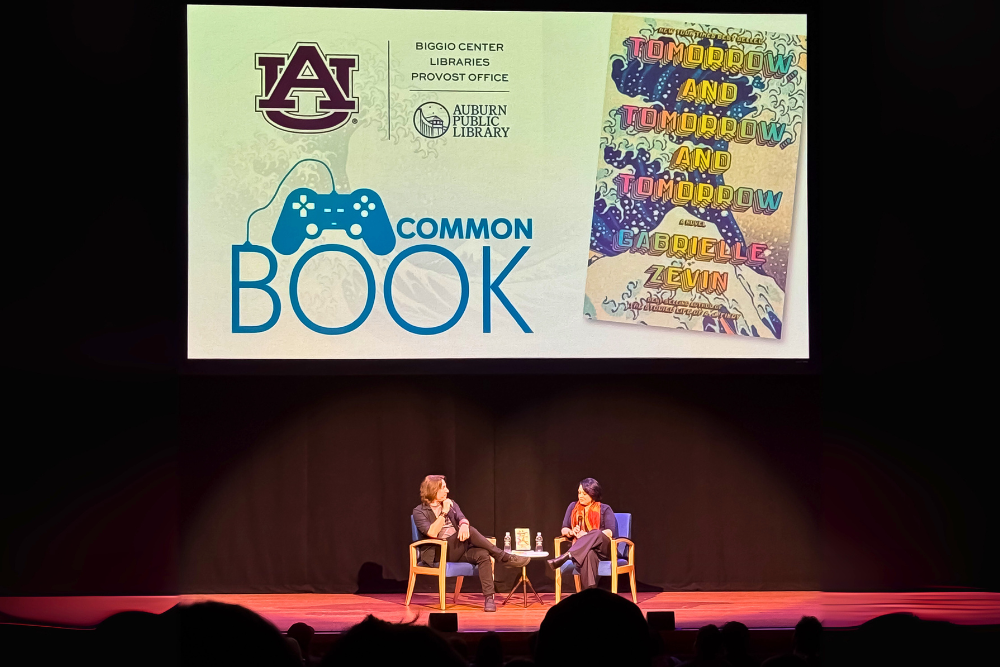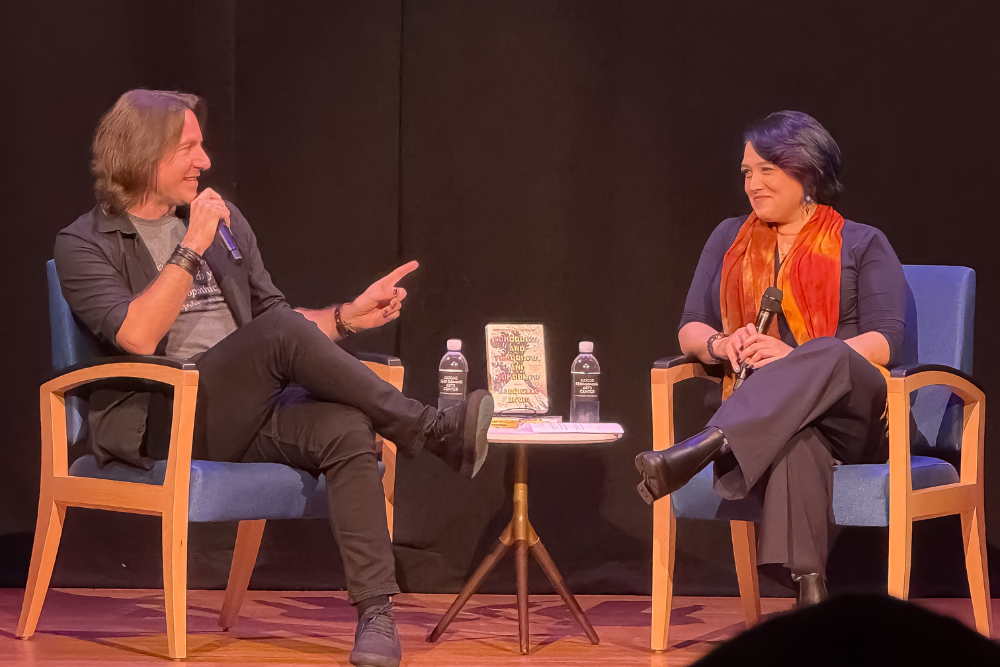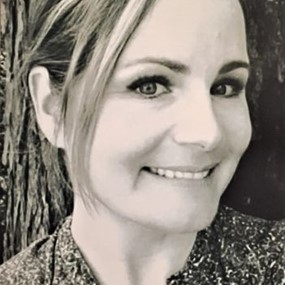Critical Role, Critical Lessons: Matthew Mercer Talks Story and Community

Since 2010, Auburn’s Common Book Program has brought the Auburn Family together through the power of story. This year’s selection, “Tomorrow, and Tomorrow and Tomorrow” by Gabrielle Zevin, follows Sam and Sadie through decades of friendship, creativity, failure and second chances within the games industry.
To carry those themes off the page and into lived experience, Auburn recently welcomed Matthew Mercer, celebrated voice actor and Dungeon Master, for a conversation with role-playing game scholar and Jean W. Liles Professor of English Emily Friedman at the Jay and Susie Gogue Performing Arts Center, where students, faculty and staff gathered to take part in the discussion.
Finding Community and a Creative Path
For those new to his work, Mercer is best known for "Critical Role", a show where he and fellow professional voice actors play Dungeons & Dragons (D&D). In this tabletop role-playing game, players describe what their characters do while the Dungeon Master guides the story, world and challenges. The result is long-form, improvisational storytelling where entire worlds are built together.
Mercer’s journey to becoming one of gaming’s most recognized storytellers was anything but linear. A self-described “shy nerd kid,” he first discovered belonging in anime clubs, gaming circles and fan conventions — spaces that showed him, in his words, “there are more of us.” Those early communities gave him the courage to imagine a creative life.
Originally set on animation, Mercer earned acceptance into CalArts. Uncertain about the cost and direction, he pivoted to the video game industry instead. What sounded like a glamorous gig playing games for 12 hours a day quickly turned into months of debugging obscure titles like "The Land Before Time: Great Valley Racing Adventure." He laughed as he retold the story but acknowledged how much he learned about game development from those years. His dedication carried him into more advanced production roles, where he contributed to blockbuster titles such as "God of War" and "Modern Warfare."
Even with that success, Mercer felt something was missing. He eventually downsized to a small Los Angeles apartment, invested his savings in workshops and pursued a full-time career in voice acting.
It was a long season of rejection and resilience, but the pieces slowly began to fall into place.
“I’m a big fan of trying something and failing over not trying at all. I’d rather have the experience of saying I gave it a shot and it didn’t work out, as opposed to always having that question.” ~ Matthew Mercer
Tabletop Games as a Training Ground
Through it all, tabletop games remained Mercer’s constant. Running D&D campaigns for friends and coworkers taught him how to build worlds, inhabit characters and guide players through shared adventures. He describes Dungeon Mastering as “building toys for your friends” and guiding them through the adventure.
“It was also a way to trick people I liked into spending more time with me,” he said with a laugh. “Hey, I like you. You should come over once every few weeks. We’ll spend six hours together. Okay, next weekend? Cool, I’ll see you there.”
Those home games became the foundation for "Critical Role." What began as a private pastime among friends soon grew into a global community, inspiring families to start their own games and raising money for causes such as children’s literacy.
“This community that’s running around our silly little game is actually enacting positive change,” Mercer said. “That was when I knew this was something really special.”
Storytelling as a Human Tradition
Mercer reminded the audience that storytelling is less about fighting monsters and more about listening, sharing and making space for others. He described collaborative play as “half math, half jazz” and deeply human.
“It’s a very core, primal experience to tell stories collaboratively and communally. Since there has been fire and migration, human beings have relaxed at the end of a hard day to sit around and have elders tell myths and stories to inspire the next generation.” ~ Matthew Mercer
Tabletop games revive that tradition, teaching confidence, empathy and teamwork while sparking creativity that no one could achieve alone.
“Even if you don’t have the confidence it would take to talk publicly in front of a group, it's an opportunity that invites you and other people to build a story together,” he said. “It gives you the opportunity to create and inhabit personas that might be aspirational to you, to learn things about yourself, to learn better teamwork skills, to hold space for a spotlight for others, how supporting each other works towards a greater goal.”
As "Critical Role" has expanded into animation, video games and its own analog game publishing company, Darrington Press—which launched the tabletop role-playing game "Daggerheart" this year—Mercer and his friends have protected the heart of it all: the table.
“We’re coming on 10 years, and we all still love each other as much, if not more, than we did the first day,” he said. “That comes from fiercely guarding our space.”

A Message of Hope and Creativity
Mercer closed with a hopeful and grounding message: true personal and professional success is measured in building something that outlasts you and creating spaces where others can thrive. Whether you’re writing a poem, conducting research or starting a club, the stories and communities you shape ripple outward in ways you may never expect.
“The human spirit needs to play. It is a very healthy and necessary part of happiness,” Mercer said. “I think culturally, there has been a sentiment that once you achieve adulthood, you're not supposed to play or you're only supposed to find play in certain kinds of ways. Continue to find joy in play, invite people to play, find unique ways to play and tell stories throughout all that — because goodness knows the world needs more and more stories.”
Continuing the Conversation
The conversation around storytelling, creativity and play continues this fall with the "Writing About Games" series.
On Oct. 16, Cameron Kunzelman, assistant professor at Mercer University and author of “The World Is Born from Zero and Everything Is Permitted: On Assassin’s Creed,” will present “A Granular Reality: How Games Model the World.” On Oct. 30, renowned game designer and museum curator Meguey Baker will discuss “Playing With the Fabric of Reality: History, Textiles and Worldbuilding.” The series concludes on Nov. 18 with games journalist Quintin Smith, co-founder of "Shut Up & Sit Down" and host of "People Make Games," presenting “Playful Criticism: A Conversation on a Career in Game Journalism and Content Creation.”
All talks are free and open to the public and will take place at 4 p.m. at the Caroline Marshall Draughon Center for the Arts & Humanities at Pebble Hill, 101 S. Debardeleben Street.







